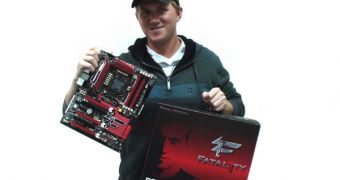Just a day has passed since we brought you the news that Jonathan "Fatal1ty" Wendel is going to get his name on other motherboards and now we have just found out this is going to be built by Taiwanese manufacturer ASRock and not Asus as we originally thought.
If you were around some years ago in the computer gaming scene, the Fatal1ty name would surely ring a bell, as Fatal1ty used to be one of the biggest names in the cyber-sports world, Abit even using his name for a series of motherboards that catered to the needs of gamers everywhere.
Although considered by many to be grossly overpriced, there's no denying the fact that these boards actually came with some pretty cool features, but they eventually were discontinued as Abit was going through a rough patch and eventually went out of the motherboard business.
However, Fatal1ty has now returned, partnering with ASRock in order to deliver a new gaming motherboard, this time built on top of the P67 chipset that targets Sandy Bridge processors.
Bearing an eerie resemblance with some Asus ROG motherboards (hence the confusion), this new board will feature a 16-phase power delivery circuit, three PCIe 2.0 x16 slots that support CrossFireX and 3-way SLI, a UEFI BIOS as well as six SATA 6Gbps and six USB 3.0 ports.
The board will be officially released during CES 2011, pricing being set at $250 according to the Expreview website.
According to a TweakTown video interview with Jonathan "Fatal1ty" Wendel (that is available bellow), the Fatal1ty product team decided to work with ASRock after some preliminary discussions that were held during CeBIT in Germany earlier this year.
Development had been going on for the past two or three months, the Fatal1ty product team decided to go with ASRock as they consider the Taiwanese board maker to be a "craftsman of motherboards" after inspecting their products (didn't spend that much time in the BIOS overclocking them, did you, Jonathan?) and engineers over time.

 14 DAY TRIAL //
14 DAY TRIAL //